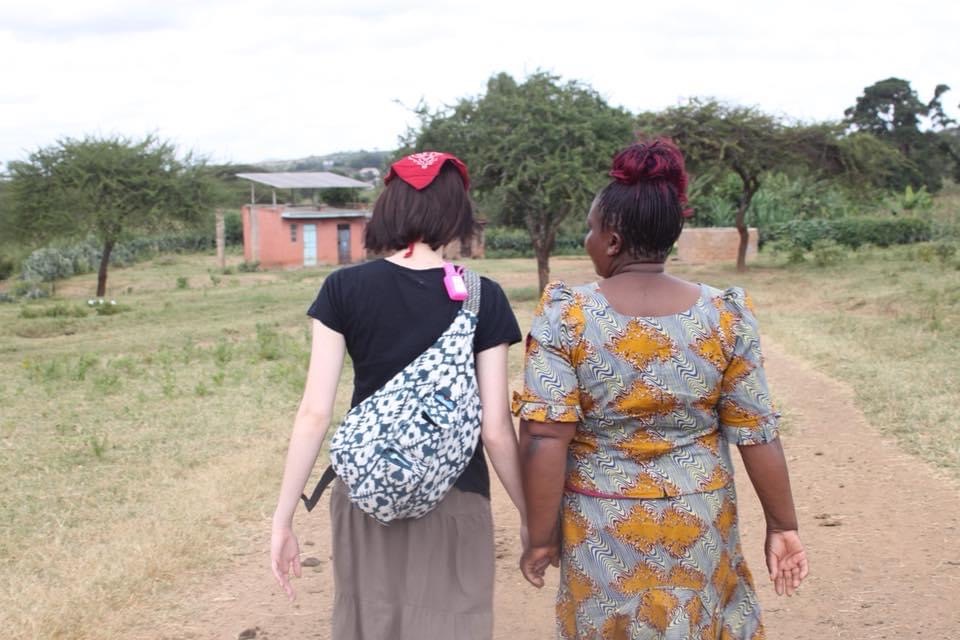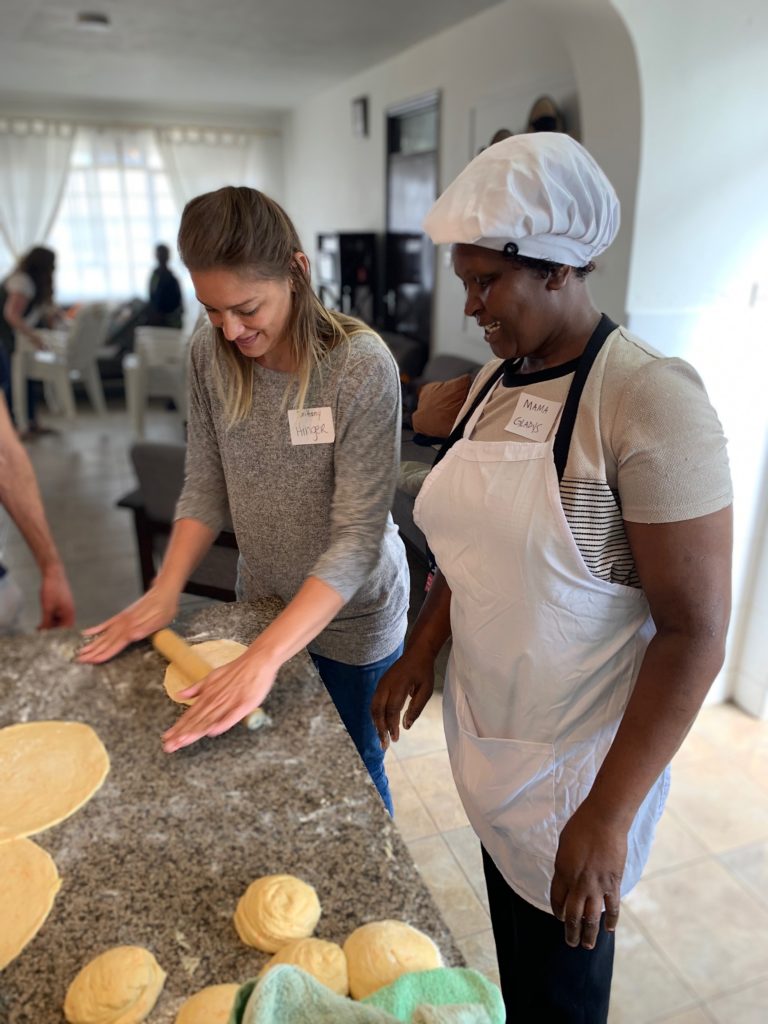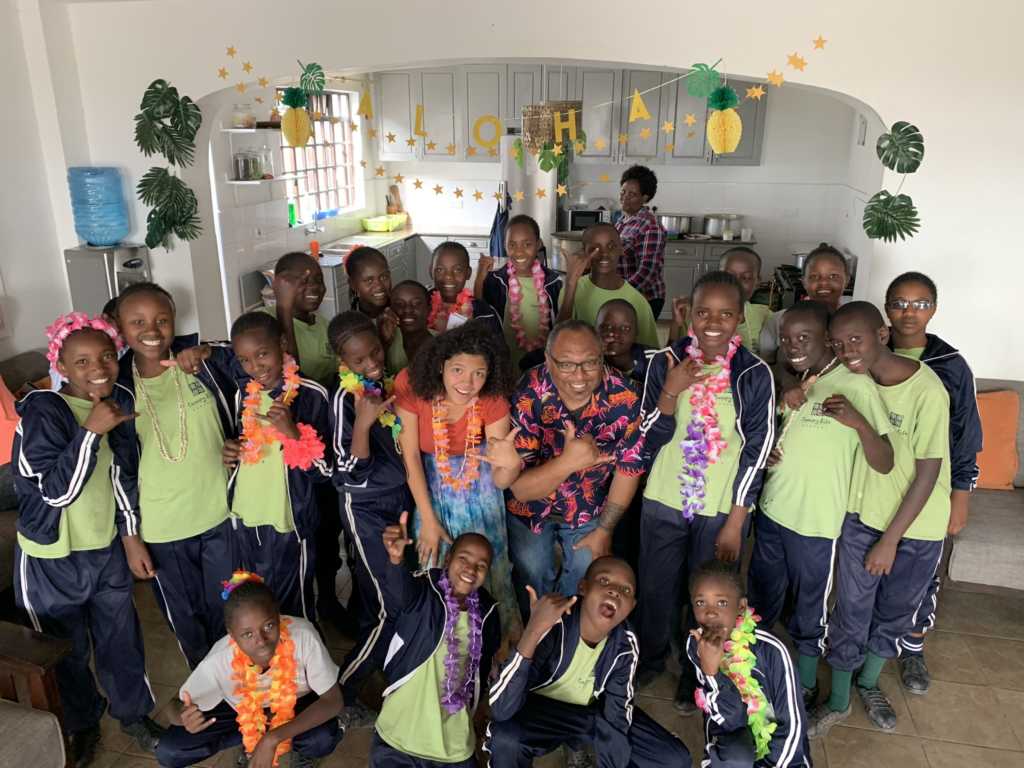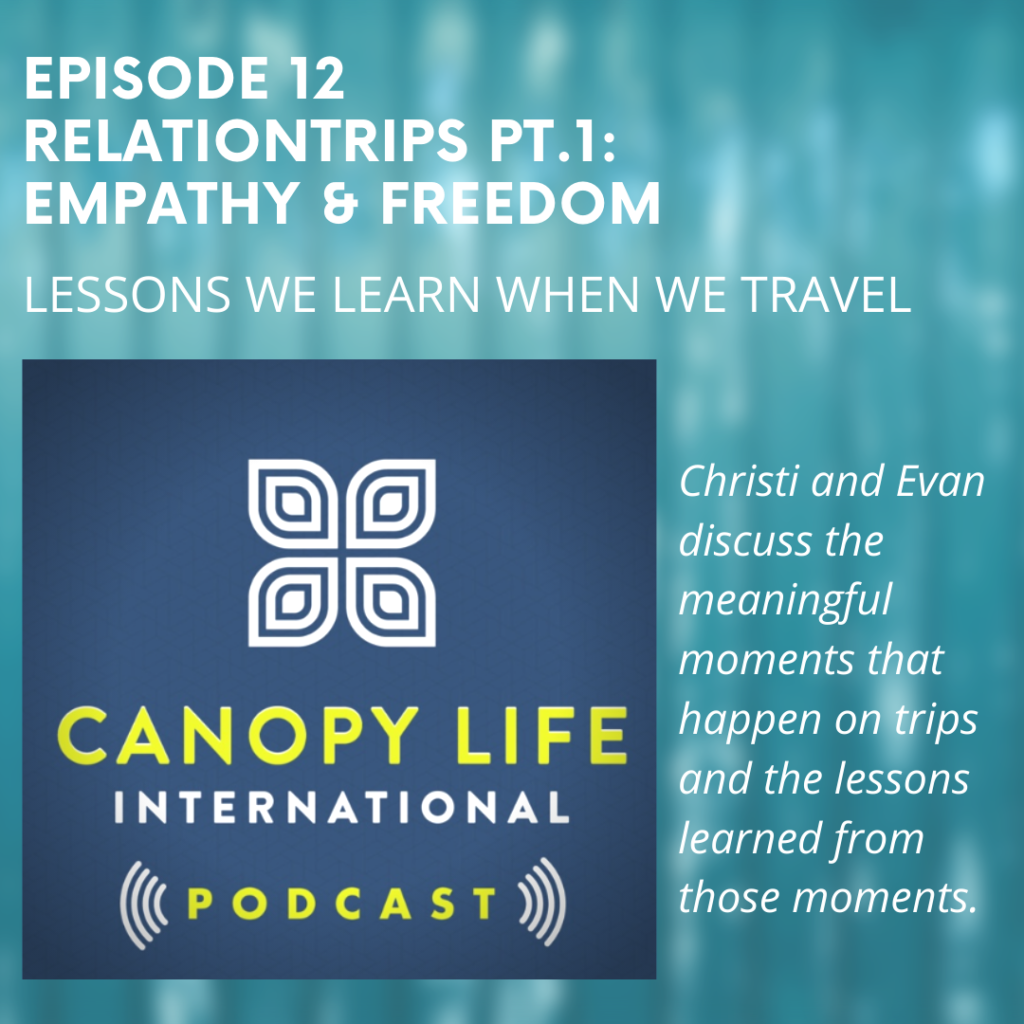Empathy, healing, dignity, worldview…these things happen when we walk in relationship with one another. Relationships help us overcome a lot of challenges, especially the gap between culture and understanding.
During the summer, we would usually be leading our relationTRIPS to Kenya. Since we can’t do that this year, we wanted to share some of the incredible lessons we have learned along the way.
In this week’s 2-part podcast, our show host, Evan Chasteen, and Canopy Life founder, Christi Gordy discuss 4 lessons we learn when we travel.
What is a relationTRIP?
RelationTRIPS are different than your typical service-oriented mission trip experiences. Service-oriented cross-cultural experiences tend to focus more on the tasks and activities involving the people you go to serve.
The reason we call our trips relationTRIPS is that they are more similar to a relationship than a mission trip. When you take a relationTRIP with Canopy Life, the reason you travel is more about just being present with people of a different culture rather than what you can do for them.
Empathy & Freedom: Lessons that benefit our U.S. travelers
There are a few lessons learned that we hear described again and again by our team members when they return home. The 2 most profound lessons are those of EMPATHY and FREEDOM.
EMPATHY
Empathy is the ability to see the world through someone else’s eyes and it only happens when you walk alongside another person. It is probably the most impactful lesson and the lesson that is learned most often by our team members learn when they travel with us.
You can’t develop empathy simply by doing a thought experiment. Although that’s a great first step, there’s another type of empathy once all the senses are engaged…
For example, to understand how a person feels whose car is broken down on the side of the road, you have to actually be stuck on the side of the road, too. You have to experience those emotions and be in that situation to fully understand what that person is going through.

Empathy is not just about understanding a person’s struggle. Sometimes, we learn to have empathy for their joy, too.
Kenyans find such joy in serving others. This sense of community is a beautiful display of hospitality and sharing what they have with others- from a place of both necessity and a willingness to give. You may come back to the U.S. and suddenly you’re confused by the self-sufficiency you see all around you. Now, you have empathy and you see how the people in the U.S. could benefit by learning to share some of the burden of life with others.
Naturally, when we travel (both internationally and within the U.S.), we develop empathy for others.
FREEDOM
In the U.S., there are things that our society values, as a whole. They are intrinsic. These values are comfort, convenience, self-sufficiency, independence, options, and immediacy – to name a few. When these things are not present, it often leads to frustration or even anger in many situations. You don’t realize how much these things are integrated into our mindset until you go to a place where those things are not valued.
When you travel, you realize you don’t actually need some of these things you valued. You’ve experienced what it’s like to have fewer options or not have wi-fi 24/7. And you’ve experienced it with a sense of adventure. Then, you can start to adapt your life back home by applying what you learned. There is a sense of freedom with the simplicity that follows. When you experience this, you learn to have a higher tolerance for the inconveniences and to view these values as blessings rather than needs.
Our relationTRIP teams often find FREEDOM from the burdens and vices of our culture. Teams come home and realize they can actually have a less-scheduled and much simpler lifestyle and that it brings them emotional and mental freedom.
Restoring Dignity & Expanding WORLDVIEWS and IDEA BANKS
These lessons learned are not limited to our teams traveling to Kenya. When our students interact with people from another culture – where they have the opportunity to give from their wealth- DIGNITY is restored. Their WORLDVIEW and IDEA BANKS grow as they have new experiences with our relationTRIP teams.
LESSONS OF DIGNITY
“Remember the happiest people are not those getting more, but those giving more.” -H. Jackson Brown, Jr.
We often find way more joy when giving rather when we receive a gift.
It’s hard for our students to know how to give to the people who are visiting. We, as a culture, consistently put them on the receiving end of the relationship. We don’t want them to give us anything.
When you go and you are just present with them, it gives them an opportunity to give to you out of the wealth of their life.
These Kenyan students and staff have such a wealth to offer the world. They have joy, faith, contentment, incredibly deep relationships. They have great resourcefulness. They are patient, as they have had to tolerate and overcome the many inconveniences they face. They’re incredibly loving…
We have to be present with them in order for them to give those things to us. This creates the space for them to experience the joy of giving to us, and that elevates their dignity. It takes them out of the place of constantly receiving to being the one who gets to give.
They get to offer you something. That brings them so much confidence and joy when you try to learn from them and know that they have something to offer you. It’s such a different approach than to go in viewing them or their world as a problem to be solved.
It’s the sign of a healthy relationship- where both parties were able to give and receive, rather than putting one person in a position where they feel they can only receive by assuming that person has nothing to give. When you go into a place as the giver or as the doer, it mounts up all these things that you assume that you are better at and it becomes, as it’s often referred to, as the savior complex.
“I wonder if Jesus healing the lame wasn’t always so much about the physical, as it was about saying to somebody, ‘Stand up. You have something to offer this world. Your lame hand no longer defines you. You are free.’ There is salvation in that. In that, you are healing because the hand no longer defines you. There’s dignity restored…Jesus didn’t have a savior complex, although he was the Savior.”
Evan Chasteen, Canopy Life Podcast Episode 13
People say it to us all the time: “I thought I was coming over here to give, but I have walked away as the one being blessed.”
EXPANDING WORLDVIEWS
Worldview is the filter through which you see the world. Our experiences, culture, and the people in our lives shape our worldview. You don’t get to choose this worldview.
A worldview is not something you teach someone. It’s something you acquire by doing life together. When you spend time together, you hear and see how someone reacts to something. You can watch how that person solves a problem that you didn’t even realize was a problem.
Consider the problems you see in the world around you: the inefficient systems, injustices, or simply the way that one cabinet in your kitchen never seems to close correctly! In some worldviews, you don’t see a problem. In another worldview, you see a problem, but you don’t see it as your problem, so you don’t have a response or see it as your responsibility. Maybe you see a problem that needs a solution, but you don’t have a solution. You can think of your worldview as a combination of your view of yourself and other people and God.
We can expose our students to different worldviews just by interacting with one another. Our students benefit because they suddenly start to recognize that there’s a whole world of businesses and ideas and solutions they can pursue once they recognize there is a problem.

Americans can benefit by interacting with people with different worldviews, too. It allows us to contemplate whether the things we thought of as problems are really problems after all. As we develop empathy, we may see a problem we have never noticed because we now have a greater understanding. Or maybe there are things we think we need to go fix and we now have freedom from that need because we recognize it’s not actually a problem.
Once you’ve seen the world from a different perspective, it’s almost impossible to shift back to the worldview you once had. You can never unsee those experiences.
Our hope is that our students will develop into innovative and Godly entrepreneurs and leaders. Being able to identify a problem will help inform what kinds of businesses and solutions they will center their lives around. If you can’t recognize a problem, you can’t come up with an idea to fix it.
EXPANDING IDEA BANKS
You use your idea bank to solve problems. It’s the collection of ingredients you pull from to create the recipe that’s going to be the solution.
Living in the West, you don’t realize how rapidly we build our idea banks. From interactive toys and educational television to the interactions we provide for our children are immediately filling their idea banks with a world of thought and possibility. We don’t just tell our children what a hot air balloon is, we show them on television and even put them in a hot-air balloon. There’s a broad expansion of experiences that we receive without even realizing it.
For our children in Kenya, most of them have grown up in a small rural village, and they have seen the same 10 square miles their whole life. If that idea did not exist in that 10 sq. miles, they don’t have it in their idea banks. So, in rural schools, they may talk about a hot air balloon, but they may or may not ever be shown a picture. So, it’s just this word on a page as opposed to an idea in order to get over an obstacle like a mountain.
We want to share as many ideas as possible. Every relationTRIP team creates a cross-cultural experience for our students, like teaching our students to hula or cooking food from another culture for them to try. We want them to experience field trips and cross-cultural experiences and know what it’s like to do things like fly a kite! We try to fill their idea banks to make up for what they would never experience in that 10-mile radius.

